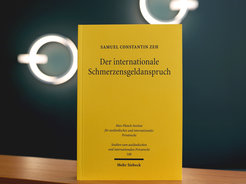International Claims for Damages for Pain and Suffering
There’s no general standard for assessing damages for non-economic harms, and outcomes vary across jurisdictions. In his dissertation, Samuel Zeh, former research associate at the Institute, examines the calculation of damages for pain and suffering in transnational cases in light of the competing interests.

If only there were a standard way to determine the value of a non-pecuniary interest or the cost of an injury to it, then calculating damages in such cases would be straightforward. But unlike a motor vehicle with a calculable time value, the value of a healthy leg is not easily expressed in monetary terms. Moreover, the level of damages can differ significantly between jurisdictions, with stark variation in what plaintiffs can recover for comparable injuries. In transnational cases, this raises difficult issues of how to handle divergent approaches to the assessment of damages.
Which jurisdiction’s law applies when it comes to assigning economic value to pain and suffering? Once the applicable law has been determined, what factual and legal connections to a foreign jurisdiction are to be considered? What is the role of public policy? Zeh examines these questions from a comparative law perspective and develops suggestions as to how to assess pain and suffering in cases with connections to foreign countries.
Dr Samuel Zeh studied law at Heidelberg University and King’s College London. He was a research associate at the Institute from 2018 to 2023. He completed his doctoral studies at the University of Hamburg in 2024.
Image: © Max Planck Institute for Comparative and International Private Law
